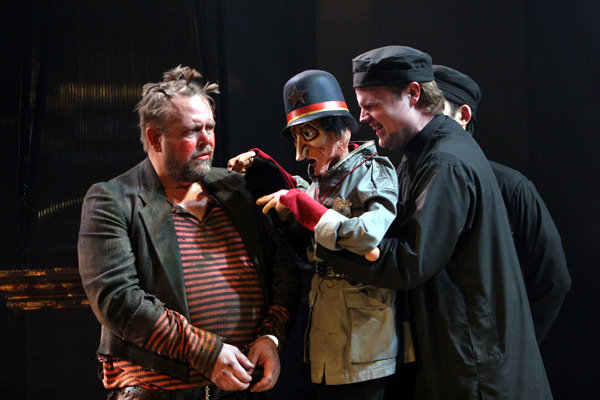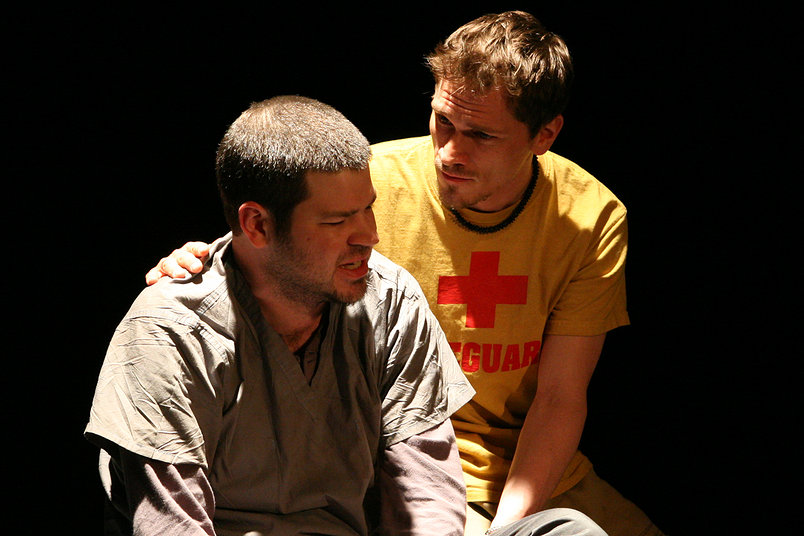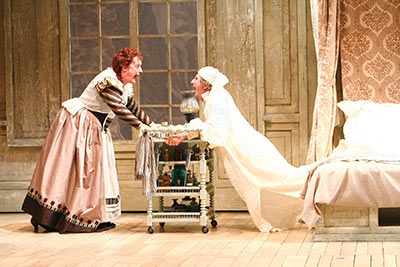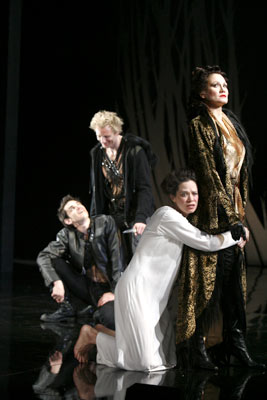|
JACQUELINE LAWTON: How long have you lived and worked as a Stage Manager in DC? What brought you here? Why have you stayed?
JENN CARLSON: I have been working as a Stage Manager in the DC metro area since 2001. After graduating from Norwich University: the Military College of Vermont in 2000 and spending a few brief months as a vacuum cleaner salesperson and a substitute Debate teacher for my high school district, I packed my car and drove from Layton, UT to New Orleans, LA. At that point I flipped a coin to decide to stay or to keep driving. I lost the toss and kept driving to DC. I’ve stayed because this is one of my three favorite places in the United States. You have a vibrant theater community, more history than you can shake a stick at, and all of my military friends eventually transfer through here. Also, I married a local rock musician in 2004 who grounds this former military brat more than anything ever has. JL: What excites you most about being a Stage Manager? What do you feel your greatest challenges are? JC: I live for the accomplishment, the opening night, the long string of cues balanced precariously upon another going off without a hitch and transparently to an enthralled audience. When the work is hard and the hours are long what keeps me going is the process by which actors, designers, directors and crew start as strangers and end as friends and fellow artists. Sometimes it is hard to balance camaraderie with professionalism. As a Stage Manager I almost never go out and socialize with my cast until the production is over. I feel that I need that distance to ensure that I am treating everyone fairly and professionally and that I can effectively manage the drama on and off stage. It is a choice and I know other Stage Managers have closer relationships with their artists. JL: What traits do you feel a successful Stage Manager should have to support the health and growth of a production? JC: I learned a lot from my alma mater about what traits an individual needs to succeed. Two quotes from the Norwich University Cadet’s Creed always stick with me when working on a production. They are: “I believe that the cardinal virtues of the individual are courage, honesty, temperance and wisdom; and that the true measure of success is service rendered...” “I believe that real education presupposes a sense of proportion in physical, mental, and moral development; and that he alone is educated who has learned the lessons of self-control and open-mindedness.” I have never gone wrong following that advice. As a professional I never ask an actor, stage hand, or company member to do something I would not do myself. A Stage Manager needs a healthy dose of humor, patience, and the ability to exude calm when there is a storm inside you. It also doesn’t hurt if you are a control freak with a side of organizational anal retention. JL: Does your work as a Stage Manager pay the bills? If not, what other work do you do and how do you find a balance? JC: Unfortunately no. Mostly because I have chosen to stay non-union and stage manage with smaller companies and assistant stage manage with union theaters. I have been lucky to work as an IT project manager with an NGO since I first moved to DC and they have been very accommodating of my theater habit, even to the point of donating rehearsal and meeting space for quite a few of the productions I have helmed. Most recently I have opened my own birth services business, Prodigious Birth Services, to serve the DC area as a trained birth doula. It may not seem obvious but IT, stage management, and doula work are all the same set of skills. You have to make people who all speak different languages communicate and come together for the culmination of the project. I think that the change of environment for each job keeps me fresh and allows one to wear away the stress of the other. When I do have free time I have my husband Eddie and my smart and impish daughters, Moira and Ari, who help me gain much needed perspective. JL: Looking at your body of work as a Stage Manager in this community, how conscious are you of selecting plays by women or people of color when deciding your season? JC: It is a measure of how far I have come in this community and this profession that I can pick and choose projects now instead of taking everything that comes to my door. As a mother of two girls I am very conscious of the disparity between roles for men and those for women and do tend to gravitate toward projects that are more inclusive. In my career I have been proud to work at Horizons Theater which was composed of all women and projects based on women’s issues. I am currently a company member of both Forum and the Hub Theatres who do a good job of balancing their season and giving strong voices to women and people of color. JL: How do you feel the DC theatre community has addressed the issues of race and gender parity? How has this particular issue impacted you and your ability to work? JC: I love the inclusivity of the DC Theater. I love that there are so many companies bringing so much work to the stage. I love how many female directors and stage managers and artistic directors I have worked with. Honestly, I don’t feel I have ever been hired or not hired due to my gender in this profession and that is not something I can say for my work in the NGO arena. There are still many issues that need to be addressed with regard to what audiences we need to serve in the DC community and selecting projects that promote race parity but I believe DC is on the right track. JL: DC audiences are ... JC: What keeps this ship afloat. Without them we are just workshops who shout into the rain. JL: DC actors, designers and directors are .. JC: Pretty amazing as a group. Every time I walk into a rehearsal space I know that I am going to learn something new. These artists have a lot to teach me and our audience about their backgrounds and life experiences. DC is a crossroads. Some artists are born here and some are just visiting but they all have a good deal to teach us. JL: DC critics are ... JC: Usually not allowed backstage on my shows. I believe very much in the professional critic (my husband is a professional film critic) but I do know how powerfully a good, bad, or indifferent review can affect my actors so my rule is, read them on your own time and do not bring reviews backstage. I love how diverse our pool of critics have become and the multitude of venues that have blossomed to showcase their love of our theater and their message. I think this diversity only benefits our audiences but reviews are still outlawed backstage. JL: What advice do you have for an up and coming DC based stage managers? JC: Learn by doing. Jump in. Volunteer. Respect your fellow artists. Be kind but firm. Be professional but fun. Learn that you aren’t born knowing everything and gather the knowledge that each project brings you. JL: What's next for you as a stage manager? Where can we keep up with your work? JC: I have two shows this season. I will be stage managing the remount of The Last Days of Judas Iscariot with Forum Theatre and Abominable at the Hub Theatre. You can find my work online at www.jenncarlson.com
1 Comment
JACQUELINE LAWTON: How long have you lived and worked as a stage manager in DC? What brought you here? Why have you stayed?
CARY GILLETT: I graduated from the University of Maryland in 1998 and have been working as an SM ever since. I love the DC area and have no desire to leave. It is a wonderful place to live and work. JL: What excites you most about being a stage manager? What do you feel your greatest challenges are? CG: I love being in the room when it all happens. I love bringing my strength in organization to a group of artists and help them achieve their dreams. My greatest challenge has always been and will always be saying no. I always take on too much. JL: What traits do you feel a successful Stage Manager should have to support the health and growth of a production? CG: Organization, communication and a sense of humor. JL: Does your work as a Stage Manager pay the bills? If not, what other work do you do and how do you find a balance? CG: I used to be a full time free-lance SM but have sent the last 5 years as a full time production manager. I still dabble in stage management from time to time and now teach it at the University of Maryland. JL: Looking at your body of work as a stage manager in this community, how conscious are you of selecting plays by women or people of color when deciding your season? CG: I’m not sure how much the playwrights have influenced my decisions but I always enjoy working with female directors. JL: How do you feel the DC theatre community has addressed the issues of race and gender parity? How has this particular issue impacted you and your ability to work? CG: I feel we are growing as a community towards awareness and inclusion. We still have a long way to go but we are headed in the right direction. JL: DC audiences are ... CG: Fantastic and very smart JL: DC actors, designers and directors are … CG: Innovative and fearless JL: DC critics are ... CG: Don’t know. I never read reviews… JL: What advice do you have for an up and coming DC based stage managers? CG: Learn as much as you can about every aspect of theatre craft and work at as many theatres as you can until you find your perfect niche. JL: What's next for you as a stage manager? Where can we keep up with your work? CG: Currently teaching an intro the stage management class and mentoring a group of 12 SMs and ASMS on 5 shows this semester. Exhausting but exhilarating work. |
My BlogI'm a playwright, dramaturg, and teaching artist. It is here where you'll find my queries and musings on life, theater and the world. My posts advocate for diversity, inclusion, and equity in the American Theatre and updates on my own work. Please enjoy!
Categories
All
Archives
June 2020
Reading List
|






